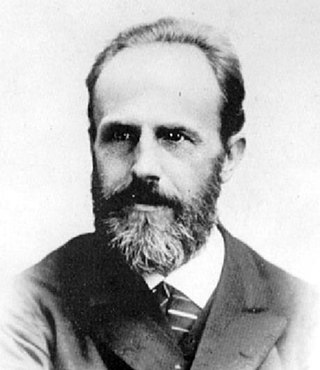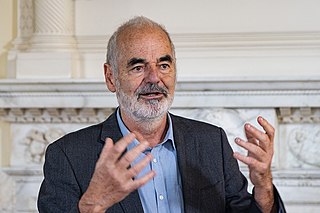Related Research Articles
A graphical model or probabilistic graphical model (PGM) or structured probabilistic model is a probabilistic model for which a graph expresses the conditional dependence structure between random variables. They are commonly used in probability theory, statistics—particularly Bayesian statistics—and machine learning.

Thorvald Nicolai Thiele was a Danish astronomer and director of the Copenhagen Observatory. He was also an actuary and mathematician, most notable for his work in statistics, interpolation and the three-body problem.
Anders Hjorth Hald was a Danish statistician. He was a professor at the University of Copenhagen from 1960 to 1982. While a professor, he did research in industrial quality control and other areas, and also authored textbooks. After retirement, he made important contributions to the history of statistics.

Alexander Philip Dawid is Emeritus Professor of Statistics of the University of Cambridge, and a Fellow of Darwin College, Cambridge. He is a leading proponent of Bayesian statistics.
Stephen Elliott Fienberg was a professor emeritus in the Department of Statistics, the Machine Learning Department, Heinz College, and Cylab at Carnegie Mellon University. Fienberg was the founding co-editor of the Annual Review of Statistics and Its Application and of the Journal of Privacy and Confidentiality.

George Edward Pelham Box was a British statistician, who worked in the areas of quality control, time-series analysis, design of experiments, and Bayesian inference. He has been called "one of the great statistical minds of the 20th century".

Sir David John Spiegelhalter is a British statistician and a Fellow of Churchill College, Cambridge. From 2007 to 2018 he was Winton Professor of the Public Understanding of Risk in the Statistical Laboratory at the University of Cambridge. Spiegelhalter is an ISI highly cited researcher.

Sir Adrian Frederick Melhuish Smith, PRS is a British statistician who is chief executive of the Alan Turing Institute and president of the Royal Society.

In graph theory, a moral graph is used to find the equivalent undirected form of a directed acyclic graph. It is a key step of the junction tree algorithm, used in belief propagation on graphical models.
The Guy Medals are awarded by the Royal Statistical Society in three categories; Gold, Silver and Bronze. The Silver and Bronze medals are awarded annually. The Gold Medal was awarded every three years between 1987 and 2011, but is awarded biennially as of 2019. They are named after William Guy.

Kantilal Vardichand "Kanti" Mardia is an Indian-British statistician specialising in directional statistics, multivariate analysis, geostatistics, statistical bioinformatics and statistical shape analysis. He was born in Sirohi, Rajasthan, India in a Jain family and now resides and works in Leeds. He is known for his series of tests of multivariate normality based measures of multivariate skewness and kurtosis as well as work on the statistical measures of shape.

Sir Bernard Walter Silverman, is a British statistician and former Anglican clergyman. He was Master of St Peter's College, Oxford, from 1 October 2003 to 31 December 2009. He is a member of the Statistics Department at Oxford University, and has also been attached to the Wellcome Trust Centre for Human Genetics, the Smith School of Enterprise and the Environment, and the Oxford-Man Institute of Quantitative Finance. He has been a member of the Council of Oxford University and of the Council of the Royal Society. He was briefly president of the Royal Statistical Society in January 2010, a position from which he stood down upon announcement of his appointment as Chief Scientific Adviser to the Home Office. He was awarded a knighthood in the 2018 New Years Honours List, "For public service and services to Science".
Morris Herman DeGroot was an American statistician.
Sylvia Therese Richardson is a French/British Bayesian statistician and is currently Professor of Biostatistics and Director of the MRC Biostatistics Unit at the University of Cambridge. In 2021 she became the president of the Royal Statistical Society for the 2021–22 year.
Peter James Green, FRS is a British Bayesian statistician. He is emeritus Professor and Professorial Research Fellow at the University of Bristol, and a professor at the University of Technology, Sydney. He is distinguished for his contributions to computational statistics, in particular his contributions to spatial statistics and semi-parametric regression models and also his development of reversible-jump Markov chain Monte Carlo.
Gareth Owen Roberts FRS FLSW is a statistician and applied probabilist. He is Professor of Statistics in the Department of Statistics and Director of the Centre for Research in Statistical Methodology (CRiSM) at the University of Warwick. He is an established authority on the stability of Markov chains, especially applied to Markov chain Monte Carlo (MCMC) theory methodology for a wide range of latent statistical models with applications in spatial statistics, infectious disease epidemiology and finance.

Julian Ernst Besag FRS was a British statistician known chiefly for his work in spatial statistics, and Bayesian inference.
Nicola G. "Nicky" Best is a statistician known for her work on the deviance information criterion in Bayesian inference[B][E] and as a developer of Bayesian inference using Gibbs sampling.[A][D] She is a former professor of biostatistics and epidemiology at Imperial College London and is currently a biostatistician for GlaxoSmithKline.
Kevin McConway is emeritus professor of applied statistics at the Open University, where he spent most of his career. He was the first Vice President of the Royal Statistical Society, from 2012-2016.
Christian P. Robert is a French statistician, specializing in Bayesian statistics and Monte Carlo methods.
References
- ↑ "Curriculum Vitae of Steffen L. Lauritzen". University of Copenhagen.
- ↑ Steffen Lauritzen's homepage
- ↑ "Professor Steffen Lauritzen". Jesus College, Oxford.
- ↑ "Professor Steffen Lilholt Lauritzen FRS". Royal Society.
- ↑ DeGroot Prize, Archived 2010-05-03 at the Wayback Machine International Society for Bayesian Analysis. Accessed 27 January 2010